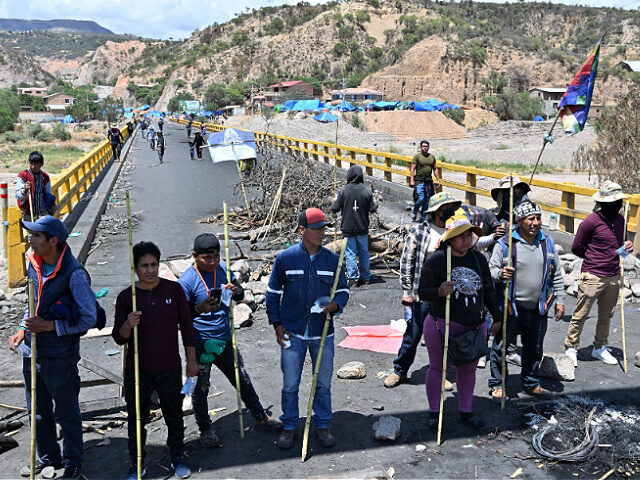Bolivia’s socialist former president Evo Morales, wanted on charges of pedophilia, claimed on Tuesday that he is using vehicles borrowed from the Venezuelan socialist regime to block Bolivia’s major roads, starving out the populace.
Morales commanded his followers to erect violent blockades across Bolivia’s main roads to avoid a possible arrest stemming from an ongoing investigation into accusations of statutory rape and human trafficking allegedly committed during his presidency.
The blockades, which started over 15 days ago, have caused more than $1.3 billion in damages to Bolivia’s economy, leading to growing shortages of food, medicine, and other goods. The violent pro-Morales protesters have assaulted police officers with stones and, in some cases, dynamite. On Tuesday, a dynamite stick reportedly exploded in the hands of a ten-year-old, who lost most of his fingers after protesters delayed the passage of an ambulance transferring the injured minor.
The socialist leader admitted using “borrowed vehicles” provided by the Venezuelan Maduro regime in remarks during his own radio show Kawsachun Coca. The admission comes shortly after Bolivian lawmaker Jairo Guiteras denounced that Morales is using a vehicle registered under Miguel Ángel Lozano, who presently serves as the head of the state-owned Petróleos de Venezuela PDVSA oil company’s Bolivian division.
According to Morales, current socialist President Luis Arce — his erstwhile protegé now embroiled in a power struggle with Morales over control of the country — is aware of the Venezuelan vehicular aid.
“In a meeting abroad there was Lucho [Luis Arce], there were some colleagues from Venezuela and Cuba, and with Lucho’s knowledge, Venezuela lent me the two vehicles for security reasons,” Evo said without giving further details.
Morales was onboard the Venezuelan state-owned vehicle on Sunday at the time attackers allegedly shot at him in a purported and dubious failed “assassination” attempt. Morales accused the Bolivian government of being behind the purported plot.
The Bolivian government has challenged Morales’ accusations to several inconsistencies in his own public statements, with government officials accusing Morales of being a “liar” and seeking to stage a “theater” show through the dubious murder plot.
One of the main inconsistencies is centered around claims made by Morales, who originally stated that he shot at one of the attacking vehicle’s tires with a firearm. He changed his story hours later, claiming that he did not have “even a stick” to defend himself. Morales, who for decades has spoken Spanish extensively in public, has attributed the inconsistencies to his “bad Spanish.”
According to the version of the events presented by the Bolivian government, Morales’ vehicle first opened fire at police agents stationed at an anti-drug checkpoint. The vehicle allegedly refused to stop at the checkpoint, running over a police officer.
Morales, after admitting that one of the “attacked” vehicles belongs to the Venezuelan state, expressed that, “if the owners allow it,” the bullet-ridden vehicles should stay in Bolivia and be exhibited in a museum.
Lawmaker Guiteras, who first denounced Morales’ use of Venezuelan vehicles, told the Spanish news agency EFE that an investigation should be launched to determine “what financing and what kind of support Evo Morales is receiving from PDVSA and the Venezuelan State.”
“That is to say, the Venezuelan State, through its oil company, is getting involved in financing Evo Morales? Are they financing the blockades? Are they financing Morales’ campaign?” Guiteras asked. “This is something that should call our attention because it threatens the security and sovereignty of the Bolivian State.”
According to the lawmaker, Morales’ statements are a “confession” that he receives “support in kind from the Venezuelan government” and this should be sanctioned in accordance with local laws.
Tahuichi Tahuichi, a member of Bolivia’s Supreme Electoral Tribunal (TSE), told local the local news channel Unitel on Tuesday that the ruling Movement Towards Socialism (MAS) party could lose its legal status if a formal complaint is filed alleging that there was a flagrant violation the nation’s political parties law, which explicitly prohibit parties from receiving foreign financing or contributions.
“No institution, no political organization can receive support, economic subsidy from a foreign company. No political party, none. Under sanction of cancellation of legal personality,” Tahuichi said.
“That denunciation has to be proven. The Public Ministry does its work, its assessment, issues the respective resolution, once it is proven, I emphasize, the Supreme Electoral Tribunal proceeds to apply in strict compliance with article 58, paragraph K, the cancellation of the legal status of that party,” he further explained.
The power struggle between Morales and Arce has split MAS into two factions, with each side “ousting” each other’s respective leader throughout the year. TSE ruled in late May to uphold Morales as the “legal” leader of the ruling socialist party. Despite being term-limited by the constitution, Morales leads efforts to present himself as MAS’s candidate in the upcoming 2025 presidential elections.
Morales warned to EFE on Wednesday that there will be an indigenous and military “uprising” against President Arce should he be captured. Over the past weeks, he has remained under the protection of loyalists in the central region of Cochabamba, his political bastion, and where the majority of the blockades presently causing daily multi-million dollar damages to the Bolivian economy are centered at.
Christian K. Caruzo is a Venezuelan writer and documents life under socialism. You can follow him on Twitter here.

COMMENTS
Please let us know if you're having issues with commenting.